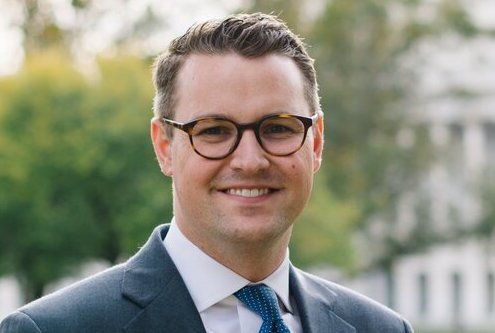Ryan Leavitt is now a practicing attorney, but during his time working under Senator Orrin G. Hatch as a senate staffer, Leavitt helped create the bill that led to the creation of the 988 suicide and crisis lifeline. Suicide prevention is particularly important to Leavitt and his wife, Alison, as Alison’s sister, Lizzie, lost her own battle with mental illness in 2014. Additionally, Alison worked as a press secretary for Congressman Chris Stewart, whose office was also involved in the creation of the lifeline. On this week’s All In podcast, Ryan Leavitt shared Lizzie’s story and how he hopes the new 988 lifeline can help others struggling with mental illness.
Listen to the full episode by clicking here or listen in the player below. You can also read a full transcript here.
The following excerpt has been edited for clarity.
Morgan Jones Pearson: As somebody that worked on this 988 hotline number, what do you feel like our expectations in terms of the difference that this number could make for people that are struggling?
Ryan Leavitt: … We were under the assumption that there were a lot of people who needed help. We’ve seen the statistics, people are dying of suicide, especially young people. And we were worried that they did not know where to go to get help. They just simply would be in a time of need and didn’t know where to turn. If they didn’t feel comfortable talking to somebody that they loved and was near them, they didn’t talk to anybody because they didn’t know where to go. And so our hope was if we make this more accessible and we roll this out in a way that’s easily memorable, that we’d get more people reaching out seeking help. And that’s exactly what we’ve seen.
Since this rolled out a little more than half a year ago, we’ve seen a huge uptick in the number of people calling seeking help. And so our hope is this is going to save lives. This is going to be a real saver of lives because, oftentimes, our hope is that [for] people are experiencing this, you reach out, someone could talk you through some of these things and help you get the kind of resources that you need to work through these feelings versus not having access to that and then ultimately resulting in a suicide, which is just devastating every time this happens, and it does happen. We see … that this ends up being the result for some people. You see it all the time, even celebrities who seemed happy and normal, and seem like they’ve got everything going for them. And then ultimately, you learn they’ve taken their own life. And this is happening all the time. And so the expectation is if we can pair resources—easily accessible resources—to people in need, the result is we’re going to save lives.
Morgan Jones Pearson: Absolutely. … I want to highlight just some of the success that the number has had since its launch. In January of this year, it was reported [by Deseret News] that in its first six months, the 988 crisis line fielded more than 2 million calls. As a result of that, in February, ABC News said that the crisis line will expand capacity in an effort to better meet people’s needs, to shorten call times, and the executive director of the suicide and crisis lifeline said, “As we expected, there’s been a significant increase in the use of the 988 suicide and crisis lifeline service since this transition to a three-digit number. And actually, we’re really grateful that more people are contacting the line with this change. That was the whole goal.” So what do you think this should tell us about the issue of suicide within our society today, the fact that this number is receiving so many calls?
Ryan Leavitt: I think what it tells us is that suicide and mental illness is a major crisis in our country. And, obviously, the creation of an easy-to-remember number is a great effort to try to help. [But] it’s certainly not the only thing that needs to be done. I think there’s a lot more that needs to be done to try to help curb these really troubling statistics, and I know there are a lot of initiatives out there to try to do that. But as a society, I think we need to try to take stock in what’s causing this? What’s the root cause? And what can we do to try to stem the tide? I think for young people, in particular, I think social media consumption is a real problem. I read something recently with teenage girls, something like 40% of young women have had thoughts of suicide and a large number have contemplated or talked about how they would commit suicide. These are not normal statistics. This is a really troubling pattern. And something needs to be done immediately to try to help get these young people help, and so I don’t profess to have all the answers of how we’re going to fix this. But I think as a country, as a society, we’re coming to this reckoning this moment where we need to collectively think about what we need to do to solve this problem and help people work through some of these issues.

